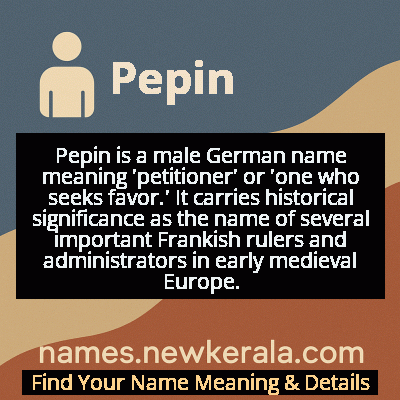Pepin Name Meaning & Details
Origin, Popularity, Numerology Analysis & Name Meaning of Pepin
Discover the origin, meaning, and cultural significance of the name PEPIN. Delve into its historical roots and explore the lasting impact it has had on communities and traditions.
Name
Pepin
Gender
Male
Origin
German
Lucky Number
6
Meaning of the Name - Pepin
Pepin is a male German name meaning 'petitioner' or 'one who seeks favor.' It carries historical significance as the name of several important Frankish rulers and administrators in early medieval Europe.
Pepin - Complete Numerology Analysis
Your Numerology Number
Based on Pythagorean Numerology System
Ruling Planet
Venus
Positive Nature
Harmonious, responsible, caring, and artistic.
Negative Traits
Overly idealistic, superficial, possessive, or jealous.
Lucky Colours
Pink, turquoise.
Lucky Days
Friday.
Lucky Stones
Diamond, turquoise.
Harmony Numbers
2, 3, 9.
Best Suited Professions
Artists, musicians, teachers, healthcare workers.
What People Like About You
Warmth, nurturing nature, artistic flair.
Famous People Named Pepin
Pepin the Short
Frankish King
Founded Carolingian dynasty and was father of Charlemagne
Pepin of Landen
Mayor of the Palace
Saint and co-founder of Arnulfing-Pippinid dynasty
Pepin the Hunchback
Frankish Noble
Led famous rebellion against his father Charlemagne
Pepin I of Aquitaine
King of Aquitaine
Defended Aquitaine against Viking invasions
Name Variations & International Equivalents
Click on blue names to explore their detailed meanings. Gray names with will be available soon.
Cultural & Historical Significance
Beyond political history, Pepin carries religious significance through Saint Pepin of Landen, who represents the ideal of Christian governance and pious leadership. The name reflects the medieval synthesis of Germanic warrior culture with Roman administrative traditions and Christian morality. In literary and cultural memory, Pepin symbolizes the foundation of French national identity and the Carolingian Renaissance that preserved classical learning during the Dark Ages. The name's persistence in historical records and its occasional modern usage testify to its enduring power as a symbol of effective governance, strategic leadership, and the complex interplay between personal ambition and public service in European history.
Extended Personality Analysis
Those bearing the name Pepin are often characterized by a unique blend of strategic thinking and practical action. They tend to be natural administrators who excel at organizing systems and people, displaying the same political acumen that made their historical namesakes successful. There's typically a methodical quality to their approach—they prefer careful planning over impulsive decisions and have a talent for seeing the bigger picture while managing details effectively. This combination makes them excellent problem-solvers who can navigate complex situations with grace and efficiency. Their 'petitioner' etymology suggests diplomatic skills and the ability to build consensus, while their historical associations indicate strong leadership potential.
Emotionally, Pepins often project stability and reliability, though they may have ambitious streaks hidden beneath calm exteriors. They value tradition and established systems but aren't afraid to innovate when necessary, reflecting the historical Pepins who transformed Frankish governance while working within existing frameworks. Socially, they tend to be respected rather than popular, building influence through competence and integrity rather than charisma alone. There's often a sense of destiny or historical consciousness about them—they may feel connected to larger narratives or traditions. Their strength lies in their ability to balance idealism with pragmatism, pursuing grand visions through practical, step-by-step approaches that earn them trust and authority over time.
Modern Usage & Popularity
In contemporary naming practices, Pepin remains an uncommon choice that carries significant historical weight and distinctive character. Its usage is primarily concentrated in European countries with Frankish heritage, particularly Belgium where the Dutch form 'Pepijn' has maintained modest popularity, occasionally ranking within the top 200 names. In France, the name appears sporadically, often in regions with strong historical connections to the Carolingian dynasty. English-speaking countries have been slower to adopt the name, though it occasionally appears among families with medieval history interests or those seeking unique traditional names. The 21st century has seen a slight uptick in usage as part of the broader trend toward historical and royal names, though it remains well outside mainstream popularity. The name's association with the musical 'Pippin' and Tolkien's hobbit character has created some cultural recognition, though these typically use the 'Pippin' spelling. Modern parents choosing this name often appreciate its aristocratic heritage, historical significance, and distinctive sound that sets it apart from more common traditional names.
Symbolic & Spiritual Meanings
Symbolically, Pepin represents the archetype of the effective administrator who rises to power through competence rather than mere inheritance. It embodies the transition from servant to master, reflecting the journey of the 'petitioner' who eventually becomes the one who grants petitions. This name carries deep metaphorical significance as a bridge between eras—specifically the transition from late antiquity to the medieval period in Western Europe. It symbolizes practical wisdom, the accumulation of influence through service, and the idea that true authority comes from demonstrated capability rather than theoretical right. The name also represents the fusion of Germanic warrior culture with Roman administrative traditions and Christian morality that characterized the Carolingian Renaissance. In a broader sense, Pepin stands for foundation-building—the often-unheralded work that establishes systems and institutions enabling future greatness. It's a name that speaks to the importance of competent governance, strategic patience, and the understanding that lasting power requires both vision and the practical ability to implement it effectively across generations.

